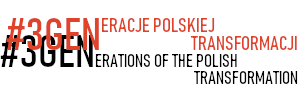The three generations of Polish transformation

The research project is carried out by the Institute of Political Studies of the Polish Academy of Sciences and financed by the Polish National Science Centre.

*
Polish Sociological Review publishes first results of the project in the article: Is the “Third Generation” of the Polish Transformation More Economically Liberal? Inter-Cohort Differences in Job Entrance and Egalitarian Attitudes (I.Sadowski, B.Mach, doi: 10.26412/psr213.01). This article looks at changes in early career, self-evaluation of economic standing, and egalitarian attitudes in three Polish birth cohorts. The first cohort is sometimes labeled the “crisis generation” (those born in 1957–59), the second is called the “transition generation” (1970–71), while the third is named the “open-borders generation” (1988–89). As the members of these generations were socialized in substantially different economic, social, and institutional contexts it is hypothesized that they will have distinct views on the economic order. To verify the hypothesis it was necessary to dissect age, period, and cohort effects. We did so using data from “The Three Generations of the Polish Transformation” project in conjunction with two older survey datasets. This allowed us to harmonize data (replicated questions, post-stratification) and synchronize data (the same biographical point) for the purpose of a suitable parametrization of statistical models. The results show that substantially different job experience has generated a significant cohort effect in the youngest of the three cohorts studied.
